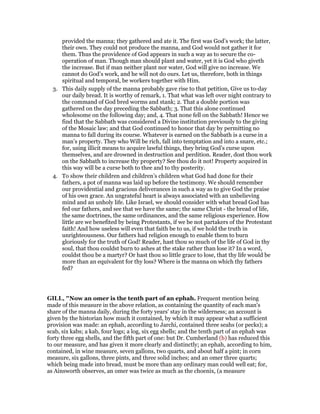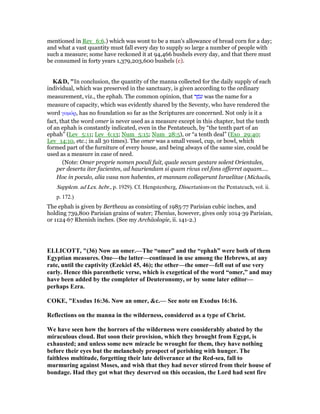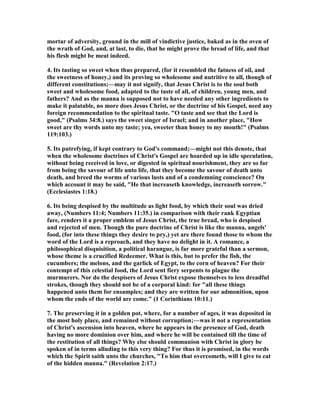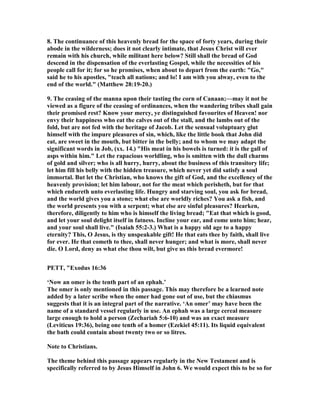The document discusses the journey of the Israelite community from Elim to the wilderness of Sin, detailing their encampments, the landscape they traversed, and their experiences over the course of about a month after leaving Egypt. It highlights the Israelites' discontent during their expedition, including their complaints about food shortages and longing for the provisions of Egypt, which reflects their distrust in God's provision. The text also examines various interpretations of the geographical locations and routes taken during this period, revealing complexities in the narrative of their journey.


![so likewise which comes by the hand of man, or some visible accident. Prodigious
madness! They would rather die by the fleshpots of Egypt, where they found themselves
with provision, than live under the guidance of the heavenly pillar in a wilderness and be
provided for by the hand of God! they pronounce it better to have fallen in the
destruction of God's enemies than to bear the fatherly discipline of his children! We
cannot suppose that they had any great plenty in Egypt, how largely soever they now talk
of the flesh-pots; nor could they fear dying for want in the wilderness, while they had
their flocks and herds with them. But discontent magnifies what is past, and vilifies what
is present, without regard to truth or reason. None talk more absurdly than murmurers.
Their impatience, ingratitude, and distrust of God, were so much the worse in that they
had lately received such miraculous favours, and convincing proofs both that God could
help them in the greatest exigencies and that really he had mercy in store for them. See
how soon they forgot his works, and provoked him at the sea, even at the Red Sea, Psa_
106:7-13. Note, Experiences of God's mercies greatly aggravate our distrusts and
murmurings.
JAMISO , "Exo_16:1-36. Murmurs for want of bread.
they took their journey from Elim — where they had remained several days.
came unto the wilderness of Sin — It appears from Num_32:1-42, that several
stations are omitted in this historical notice of the journey. This passage represents the
Israelites as advanced into the great plain, which, beginning near El-Murkah, extends
with a greater or less breadth to almost the extremity of the peninsula. In its broadest
part northward of Tur it is called El-Kaa, which is probably the desert of Sin [Robinson].
K&D, "Quails and Manna in the Desert of Sin. - Exo_16:1. From Elim the
congregation of Israel proceeded into the desert of Sin. According to Num_33:10, they
encamped at the Red Sea between Elim and the desert of Sin; but this is passed over
here, as nothing of importance happened there. Judging from the nature of the ground,
the place of encampment at the Red Sea is to be found at the mouth of the Wady
Taiyibeh. For the direct road from the W. Gharandel to Sinai, and the only practicable
one for caravans, goes over the tableland between this wady and the Wady Useit to the
upper end of the W. Taiyibeh, a beautiful valley, covered with tamarisks and shrubs,
where good water may be found by digging, and which winds about between steep rocks,
and opens to the sea at Ras Zelimeh. To the north of this the hills and rocks come close
to the sea, but to the south they recede, and leave a sandy plain with numerous shrubs,
which is bounded on the east by wild and rugged rocky formations, and stretches for
three miles along the shore, furnishing quite space enough therefore for the Israelitish
camp. It is about eight hours' journey from Wady Gharandel, so that by a forced march
the Israelites might have accomplished it in one day. From this point they went “to the
desert of Sin, which is between Elim and Sinai.” The place of encampment here is
doubtful. There are two roads that lead from W. Taiyibeh to Sinai: the lower, which
enters the desert plain by the sea at the Murkha or Morcha well, not far from the mouth
of the Wady eth Thafary, and from which you can either go as far as Tûr by the sea-
coast, and then proceed in a north-easterly direction to Sinai, or take a more direct road
through Wady Shellâl and Badireh into Wady Mukatteb and Feirân, and so on to the
mountains of Horeb; and the upper road, first pointed out by Burckhardt and Robinson,
which lies in a S.E. direction from W. Taiyibeh through W. Shubeikeh, across en elevated
plain, then through Wady Humr to the broad sandy plain of el Debbe or Debbet en Nasb,](https://image.slidesharecdn.com/exodus16commentary-160909165528/85/Exodus-16-commentary-3-320.jpg)


![CALVI , "1.And they took their journey. Moses relates, that, when after a month
the people came to the wilderness of Sin near Mount Sinai, and when their provision
failed, they rebelled against God and Moses, and manna, a new and unusual kind of
food, was given them from heaven. It is uncertain with what foods they were
sustained in the meantime. Some conjecture that they brought sufficient flour from
Egypt for their supply; but to me it seems probable that other kinds of food were
used in addition; for the barrenness of the country through which they passed was
not so great but that it produced at least fruits and herbs. Besides, we may readily
suppose, from the battle, in which it will soon be related that they conquered the
Amalekites, that they were not far from an habitable territory. But, when they were
carried away farther into the desert, all their provision began to fail, because they
had no more commerce with the inhabitants. Hence their sedition was increased,
because hunger pressed upon them more than usual. For, although we shall
afterwards be able to gather from the context that there was some previous
disturbance in the camp, still famine, which now began to affect them more, because
in these uncultivated and miserable regions the barrenness on all sides alarmed
them, gave strength to their murmurs and impatience.
COKE, ". Came unto the wilderness of Sin— The children of Israel continued some
time at Elim, according to the account given in this verse, compared with the note on
Exodus 16:27 of the former chapter. It was now just a month since they had left
Egypt. "We have a distinct view of Mount Sinai from Elim," says Dr. Shaw; "the
wilderness, as it is called, of Sin, lying betwixt them. We traversed these plains in
nine hours; being all the way diverted with the sight of lizards and vipers, which are
here in great numbers. We were afterwards near twelve hours in passing the many
windings and difficult ways which lie betwixt these deserts and those of Sinai. The
latter consist of a beautiful plain, more than a league in breadth, and nearly three in
length, lying open towards the north-east, where we enter it; but it is closed up to
the southward by some of the lower eminences of Mount Sinai.
In this direction, likewise, the higher parts of this mountain make such
encroachments upon the plain, that they divide it into two, each of them capacious
enough to receive the whole encampment of the Israelites. That which lies to the
eastward may be the desert of Sinai, properly so called, where Moses saw the angel
of the Lord in the burning bush, while he was guarding the flocks of Jethro, ch.
Exodus 3:2. A convent, called the convent of St. Catherine, is built over the place of
this divine appearance. It is near three hundred feet square, and more than forty in
height, being built partly of stone, partly with mud and mortar mixed together.
[That which is supposed to have been] the more immediate place of the Shechinah is
honoured with a little chapel, which the old fraternity of St. Basil has in such esteem
and veneration, that, in imitation of Moses, they put off the shoes from off their feet
whenever they enter it."
BE SO , ". Came into the wilderness of Sin — ot immediately, for there is
another stage of their journey by the Red sea, mentioned umbers 33:10, (in which](https://image.slidesharecdn.com/exodus16commentary-160909165528/85/Exodus-16-commentary-6-320.jpg)
![chapter, it appears, Moses designedly set down all their stations,) but omitted here,
because nothing remarkable happened in it.
This was a great wilderness between the Red sea and mount Sinai, different and far
distant from that Zin mentioned umbers 20:1, which was near the land of Edom.
ELLICOTT, "THE JOUR EY FROM ELIM.—THE MA A GIVE .
(1) They took their journey from Elim. The stay at Elim was probably for some
days. “Sin” was reached exactly one month after the departure from Egypt, yet
there had been only five camping-places between Sin and Rameses, and one journey
of three days through a wilderness (Exodus 15:22). Long rests are thus clearly
indicated, and probably occurred at Ayun Musa, at Marah, and at Elim. The places
named were the head-quarters of the camp on each occasion, but the entire host
must have always covered a vast tract, and the flocks and herds must have been
driven into all the neighbouring valleys where there was pasture. Wadys Useit,
Ethal, and Tayibeh are likely to have been occupied at the same time with Wady
Ghurundel.
All the congregation . . . came unto the wilderness of Sin.—“All the congregation”
could only be united in certain favourable positions, where there happened to be a
large open space. Such an open space is offered by the tract now called El Markha,
which extends from north to south a distance of twenty miles, and is from three to
four miles wide in its more northern half. To reach this tract, the Israelites must
have descended by Wady Useit or Wady Tayibeh to the coast near Ras Abu
Zenimeh, and have then continued along the coast until they crossed the twenty-
ninth parallel. This line of march is indicated in umbers 33:10-11, where we are
told that “they removed from Elim, and encamped by the Red Sea; and they
removed from the Red Sea, and encamped in the wilderness of Sin.”
COFFMA , "Introduction
Here we have the third instance of the murmuring of Israel (Exodus 16:1-3), the
promise of God to give them bread from heaven (Exodus 16:4-12), God's promise
fulfilled (Exodus 16:13-20), the events surrounding the very first mention of
"sabbath" in the word of God (Exodus 16:21-30), the manna named and
memorialized (Exodus 16:31-36).
This chapter is the nemesis of Biblical critics, as confessed by Harford, "This
chapter is a crux for critics ... the dispute turns on the question of whether J or E is
present, and how much of either, and if more or less of P!"[1] Harford declined to
give any analysis based upon the alleged sources of the Pentateuch. Our own
analysis finds Moses in every line of it with perhaps a single addition by the inspired
Joshua.
Of course, one of the most important questions arising from this chapter regards the
institution of the sabbath. See notes below.](https://image.slidesharecdn.com/exodus16commentary-160909165528/85/Exodus-16-commentary-7-320.jpg)
![Verses 1-3
"And they took their journey from Elim, and all the congregation of the children of
Israel came unto the wilderness of Sin, which is between Elim and Sinai, the
fifteenth day of the second month after their departing out of the land of Egypt. And
the whole congregation of the children of Israel murmured against Moses and
against Aaron in the wilderness: and the children of Israel said unto them, Would
that we had died by the hand of Jehovah in the land of Egypt, when we sat by the
flesh-pots, when we did eat bread to the full; for ye have brought us forth into this
wilderness, to kill this whole assembly with hunger."
"The congregation of Israel (Exodus 16:1) ... this whole assembly (Exodus 16:3) ..."
The use of two different words here for the entire body of Israel is by no stretch of
imagination a sign of different sources, as some critics claim, for example, this: "The
use of the word `congregation' reflects basic terminology of the later Israelite
period."[2] Back of such a comment, of course, is the allegation of various sources,
but as Allis observed, the use of various words to describe a single entity may not be
regarded as "a suspicious feature suggesting diversity of authorship, that idea being
a fundamental error."[3] We may only marvel at the naivete that supposes Moses
could not have known both words - assembly and congregation. Again from Allis,
"There is no warranty for such hair-splitting analysis."[4]
"The wilderness of Sin ..." Despite Israel's sin being a principle feature of the
narrative here, it has nothing to do with the name of this wilderness. "The name Sin
has no connection with the English word sin. The names Sin and Sinai are very
similar, but the meaning of these names is uncertain."[5] The similarity of names
leads some to identify this wilderness as lying in the vicinity of Sinai.
"The fifteenth day of the second month after ..." indicates the passage of about six
weeks after the departure from Egypt.
"The whole congregation murmured against Moses and against Aaron ..." This is
the third instance of Israel's murmuring, the others being at Pi-hahiroth (Exodus
14:10-12), and at Marah (Exodus 15:24). Upon this occasion of their murmuring,
God heard their cry and sent bread from heaven.
"Would we had died by the hand of Jehovah in the land of Egypt ... This cry puts on
the garb of piety, and names the name of Jehovah, but indicates a lack of faith in
Him, His power, and His promises."[6] We cannot be too harsh, however, in our
judgment of Israel. It was a real hardship they endured. They were suffering from
hunger. Whatever supplies they had brought out of Egypt were exhausted, and they
were tasting the bitter truth that freedom exacts a price of those who would attain it.
"When we sat by the flesh-pots ... eat bread to the full ..." Later on, they also
remembered "the cucumbers ... melons ... leeks ... onions ... and garlic" ( umbers
11:4,5). These passages indicate that Pharaoh did indeed feed his slaves, and
presumably his livestock, well, but we may not suppose that all was as well with
Israel in Egypt as these hungry Israelites romantically remembered it. "The good](https://image.slidesharecdn.com/exodus16commentary-160909165528/85/Exodus-16-commentary-8-320.jpg)
![old days" were never actually that good! It was an inescapable burden of their
freedom that they should have encountered many dangers and hardships, but this
they seemed incapable of realizing at the time.
CO STABLE, "Verses 1-3
The wilderness of Sin evidently lay in the southwestern part of the Sinai peninsula (
Exodus 16:1). Its name relates to Sinai, the name of the mountain range located on
its eastern edge. Aharoni believed that Paran was the original name of the entire
Sinai Peninsula. [ ote: Y. Aharoni, "Kadesh-Barnea and Mount Sinai," in God"s
Wilderness: Discoveries in Sinai, pp165-70.]
This was Israel"s third occasion of grumbling ( Exodus 16:2; cf. Exodus 14:11-12;
Exodus 15:24). The reason this time was not fear of the Egyptian army or lack of
water but lack of food ( Exodus 16:3).
"A pattern is thus established here that continues throughout the narratives of
Israel"s sojourn in the wilderness. As the people"s trust in the Lord and in Moses
waned in the wilderness, the need grew for stricter lessons." [ ote: Sailhamer, The
Pentateuch . . ., p273.]
PETT, "Introduction
Chapter 16 God Provides Manna and Quails for His People - The Sign of the
Seventh Day (Exodus 16:2-36).
In this chapter God provides both meat and ‘bread’ for His people. The passage
continues to reveal chiastic patterns, a pattern which also appears in Leviticus and
predominates in the book of umbers (see our commentary). The chapter can be
divided into two. Up to Exodus 16:15 it deals specifically with the promise of bread
from heaven and the provision of the manna and the quails, and the remainder
deals with various provisions and especially the institution of the Sabbath. This is
then concluded in the final few verses by describing the storing up of the manna as a
memorial.
Verse 1
‘And they took their journey from Elim and all the congregation of the children of
Israel came into the Wilderness of Sin which is between Elim and Sinai, on the
fifteenth day of the second month after their departing out of the land of Egypt.’
The analysis suggest that this verse closes the passage just completed. After a short
stay they continued their journey. They had now been travelling for a full moon
period. ‘The second month.’ Their year was now determined from the time of their
release (Exodus 12:2).
“All the congregation of the children of Israel.” Since leaving Egypt the group has
been called ‘Israel’ (Exodus 14:30-31; Exodus 15:22) and ‘the people’ (Exodus
15:24) although reference is made to ‘the children of Israel’ at worship in Exodus
15:1. (Exodus 15:19 refers back to prior to the final deliverance). This is now
defined here as ‘all the congregation of the children of Israel’, a new term found](https://image.slidesharecdn.com/exodus16commentary-160909165528/85/Exodus-16-commentary-9-320.jpg)







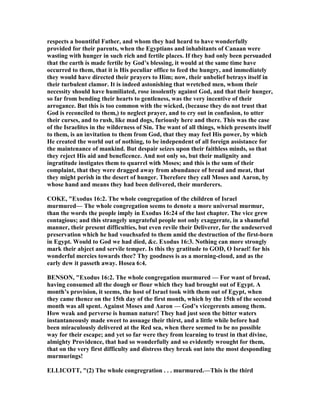



![CLARKE, "The flesh pots - As the Hebrews were in a state of slavery in Egypt, they
were doubtless fed in various companies by their task masters in particular places,
where large pots or boilers were fixed for the purpose of cooking their victuals. To these
there may be a reference in this place, and the whole speech only goes to prove that they
preferred their bondage in Egypt to their present state in the wilderness; for they could
not have been in a state of absolute want, as they had brought an abundance of flocks
and herds with them out of Egypt.
GILL, "And the children of Israel said unto them,.... They not only inwardly
murmured, and privately complained among themselves, but they spoke out their
complaints, and that in a very extravagant manner:
would to God we had died by the hand of the Lord in the land of Egypt; by one
of the plagues, or some such like plague as were inflicted on the Egyptians, which killed
many of them, and particularly the hailstorm and plague on the firstborn; suggesting
that death, even by the hand of the Lord, whether in an ordinary or extraordinary way,
was more eligible than their present circumstances: when we sat by the fleshpots, and
when we did eat bread to the full; which is an exaggeration of their former
circumstances, and the happiness of them, in order to aggravate the misery of their
present ones; for it can hardly be thought strictly true, that while they were in hard
bondage in Egypt, they had often flesh in their pots, and leisure time to sit and attend
them, either the boiling of it in them, or the eating of it when served up in dishes at the
table; which they seem to boast of, as if they had several dishes of meat at table, and sat
in great splendour, and took a great deal of time to regale themselves, and when they
indulged themselves to satiety, having fulness of bread and all provisions:
for ye have brought us forth into this wilderness, to kill this whole assembly
with hunger: but there was no danger of that at present, since they had so many flocks
and herds with them; though indeed so large a number would soon have ate them up,
and which could not so comfortably be fed upon without bread; and, besides, these they
did not choose to slay, unless under great necessity, which they reserved for sacrifice,
and for an increase.
JAMISO , "Would to God we had died by the hand of the Lord in the land
of Egypt — How unreasonable and absurd the charge against Moses and Aaron! how
ungrateful and impious against God! After all their experience of the divine wisdom,
goodness, and power, we pause and wonder over the sacred narrative of their hardness
and unbelief. But the expression of feeling is contagious in so vast a multitude, and there
is a feeling of solitude and despondency in the desert which numbers cannot dispel; and
besides, we must remember that they were men engrossed with the present - that the
Comforter was not then given - and that they were destitute of all visible means of
sustenance and cut off from every visible comfort, with only the promises of an unseen
God to look to as the ground of their hope. And though we may lament they should
tempt God in the wilderness and freely admit their sin in so doing, we can be at no loss
for a reason why those who had all their lives been accustomed to walk by sight should,
in circumstances of unparalleled difficulty and perplexity, find it hard to walk by faith.
Do not even we find it difficult to walk by faith through the wilderness of this world,
though in the light of a clearer revelation, and under a nobler leader than Moses? [Fisk].
(See 1Co_10:11, 1Co_10:12).](https://image.slidesharecdn.com/exodus16commentary-160909165528/85/Exodus-16-commentary-21-320.jpg)






![thing of the day in its day" (i), the bread day by day; to which our Lord may be thought
to allude, when he directs his disciples to pray, give us this day our daily bread; as this
would be rained every morning, the people were to go out of the camp, and gather it up
for their daily use, and which was to be done every day:
that I may prove them, whether they will walk in my law or no; by this single
instance of their obedience to his will in going out every morning to gather their bread,
that should be rained for them, he proposed to try and prove their obedience to his law
in all other respects; what regard would be had to it when it should be given, and what
might be expected from them, and likewise whether they would depend upon his
providence in this case also.
HE RY, " The care God graciously took for their supply. Justly he might have said,
“I will rain fire and brimstone upon these murmurers, and consume them;” but, quite
contrary, he promises to rain bread upon them. Observe,
1. How God makes known to Moses his kind intentions, that he might not be uneasy at
their murmurings, nor be tempted to wish he had let them alone in Egypt. (1.) He takes
notice of the people's complaints: I have heard the murmurings of the children of Israel,
Exo_16:12. As a God of pity, he took cognizance of their necessity, which was the
occasion of their murmuring; as a just and holy God, he took cognizance of their base
and unworthy reflections upon his servant Moses, and was much displeased with them.
Note, When we begin to fret and be uneasy, we ought to consider that God hears all our
murmurings, though silent, and only the murmurings of the heart. Princes, parents,
masters, do not hear all the murmurs of their inferiors against them, and it is well they
do not, for perhaps they could not bear it; but God hears, and yet bears. We must not
think, because God does not immediately take vengeance on men for their sins, that
therefore he does not take notice of them; no, he hears the murmurings of Israel, and is
grieved with this generation, and yet continues his care of them, as the tender parent of
the froward child. (2.) He promises them a speedy, sufficient, and constant supply, Exo_
16:4. Man being made out of the earth, his Maker has wisely ordered him food out of the
earth, Psa_104:14. But the people of Israel, typifying the church of the first-born that are
written in heaven, and born from above, and being themselves immediately under the
direction and government of heaven, receiving their charters, laws, and commissions,
from heaven, from heaven also received their food: their law being given by the
disposition of angels, they did also eat angels' food. See what God designed in making
this provision for them: That I may prove them, whether they will walk in my law or
no. [1.] Thus he tried whether they would trust him, and walk in the law of faith or no,
whether they could live from hand to mouth, and (though now uneasy because their
provisions were spent) could rest satisfied with the bread of the day in its day, and
depend upon God for fresh supplies tomorrow. [2.] Thus he tried whether they would
serve him, and be always faithful to so good a Master, that provided so well for his
servants; and hereby he made it appear to all the world, in the issue, what an ungrateful
people they were, whom nothing could affect with a sense of obligation. Let favour be
shown to them, yet will they not learn righteousness, Isa_26:10.
JAMISO , "Then said the Lord unto Moses — Though the outbreak was
immediately against the human leaders, it was indirectly against God: yet mark His
patience, and how graciously He promised to redress the grievance.
I will rain bread from heaven — Israel, a type of the Church which is from above,
and being under the conduct, government, and laws of heaven, received their food from](https://image.slidesharecdn.com/exodus16commentary-160909165528/85/Exodus-16-commentary-28-320.jpg)
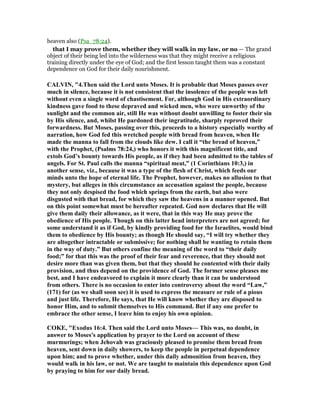

![magnificent announcement that, "I am the bread of life" (John 6:35), and in his
words that, "I am the bread that came down from heaven" (John 6:41). How is
Jesus the Bread of Life?
He came from heaven, like the manna.
He gives life (spiritually) as the manna did physically.
He is the only hope of eternal life; manna was the only hope for Israel in the
wilderness.
He is for ALL people, as the manna was for all Israel.
He was not recognized by Israel; neither did they know the manna.
He was a test for ALL people; this manna was a test for Israel.
"Know that Jehovah hath brought you out from the land of Egypt ..." (Exodus
16:6). This contrasts with the complaint of Israel to Moses and Aaron that, "Ye have
brought us forth into this wilderness" (Exodus 16:3).
"At even ... and in the morning ... ye shall see the glory of Jehovah ..." Some
understand this as reference to a visible display of some glory, as of fire, standing
over the wilderness, or seen in the cloud. There was such a glory mentioned in
Exodus 16:10. In his comment on that Dummelow said, "Here a special radiance is
meant ... as with an appearance of fire."[7] It appears that Keil's view on the glory
here is correct:
Here, seeing the glory of Jehovah did not consist in the sight of the glory of the Lord
which appeared in the cloud, as mentioned in Exodus 16:10, but in their perception
or experience of that glory in the miraculous gift of flesh and bread.[8]
The Jewish understanding of this place is like that of Keil's. "In Exodus 16:7, the
[~kabowd] (glory) manifested itself by the miraculous gift of manna."[9]
"Gather a day's portion every day ..." (Exodus 16:4). it is believed by some that this
is the O.T. root of that line in the Lord's Prayer, "Give us this day our daily
bread."[10] By providing only one day's rations at a time, God would prove, or test,
Israel to find out if they would really trust in God and walk according to his rules.
Here also is the first of a number of rules concerning the manna which were to be
faithfully observed by Israel:
A. THE LAW AS TO QUA TITY. Only one day's portion to be gathered at a time.
The same amount for each person.
B. THE LAW AS TO TIME. To be gathered only in the mornings. one to be](https://image.slidesharecdn.com/exodus16commentary-160909165528/85/Exodus-16-commentary-31-320.jpg)
![gathered on the seventh day.
C. THE LAW AS TO USE. one of it to be left until the next day. A lesson against
hoarding.
It would be wonderful if it could be reported that Israel observed these rules
regarding the manna, but the truth is:
They failed at each point. They tried to hoard (Exodus 16:20).
They went out to gather on the Sabbath (Exodus 16:27). They showed both
disobedience and unbelief, for it had been distinctly said of the seventh day, "in it
there shall be none" (Exodus 16:26) ... God had miraculously supplied their wants,
yet so little sensible were they of his goodness, that they declined to obey even the
few simple rules which God had laid down for the reception and use of his benefits.
[11]
In these observations, of course, there appears the manna as a type of the Gospel of
Christ, which is: (1) from heaven, not from earth; (2) which must be gathered early,
heeded early in life; (3) which must be gathered daily (one cannot store up enough
gospel to last for the future); (4) if hoarded (not shared with others) it becomes foul;
and (5) it must be eaten (Revelation 10:1-11). (We cannot observe communion for a
month, or a year, on one particular Sunday).
"On the sixth day ..." "The sixth day here probably means the sixth day after the
appearance of the manna,"[12] and it has no connection with a certain day of the
week, nor with a sabbath, the latter having nowhere been mentioned at this point in
the entire O.T.
"Ye murmur against him (Jehovah) ..." (Exodus 16:8). Here is established a
principle which holds throughout all dispensations of the grace of God, including
our own. Murmuring against those men whom God has called to teach his Word is
actually murmuring against God. An apostle has warned us, " either murmur ye,
as some of them murmured and perished by the destroyer" (1 Corinthians 10:10).
EXPOSITOR'S DICTIO ARY, "St. John of the Cross notes on this text that the
manna was not given to the Israelites until the corn they had brought from Egypt
failed. "This teaches us that we must first renounce all things, for this manna of the
angels neither belongs nor is given to the palate which still relishes the food of men."
He quotes the words of umbers 11:4, "Who shall give us flesh to eat?" "They
would not content themselves with that so simple manna, but desired and begged for
manna of flesh. And our Lord was displeased because they wished to mix so low and
coarse a food with one so high and pure:—a manna which, simple as it was, contains
within itself the savour of all foods."
—Obras, vol1. p19.](https://image.slidesharecdn.com/exodus16commentary-160909165528/85/Exodus-16-commentary-32-320.jpg)





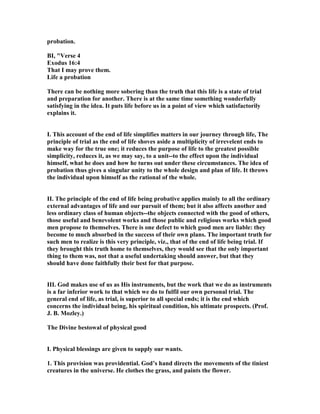



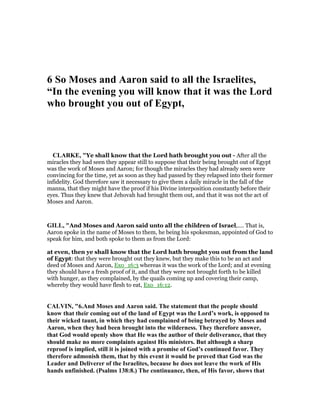


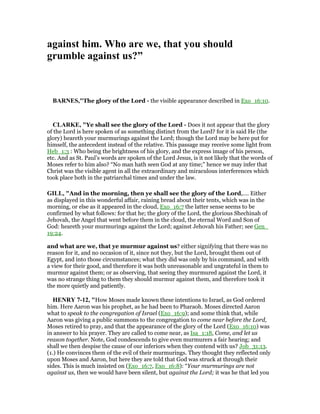
![into these straits, and not we.” Note, When we murmur against those who are
instruments of any uneasiness to us, whether justly or unjustly, we should do well to
consider how much we reflect upon God by it; men are but God's hand. Those that
quarrel with the reproofs and convictions of the word, and are angry with their ministers
when they are touched in a tender part, know not what they do, for therein they strive
with their Maker. Let this for ever stop the mouth of murmuring, that it is daring
impiety to murmur at God, because he is God; and gross absurdity to murmur at men,
because they are but men. (2.) He assures them of the supply of their wants, that since
they had harped upon the flesh-pots so much they should for once have flesh in
abundance that evening, and bread the next morning, and so on every day
thenceforward, Exo_16:8, Exo_16:12. Many there are of whom we say that they are
better fed than taught; but the Israelites were thus fed, that they might be taught. He led
him about, he instructed him (Deu_32:10); and, as to this instance, see Deu_8:3, He fed
thee with manna, that thou mightest know that man doth not live by bread only. And,
besides this, here are two things mentioned, which he intended to teach them by sending
them manna: - [1.] By this you shall know that the Lord hath brought you out from the
land of Egypt, Exo_16:6. That they were brought out of Egypt was plain enough; but so
strangely sottish and short-sighted were they that they said it was Moses that brought
them out, Exo_16:3. Now God sent them manna, to prove that it was no less than
infinite power and goodness that brought them out, and this could perfect what was
begun. If Moses only had brought them out of Egypt, he could not thus have fed them;
they must therefore own that that was the Lord's doing, because this was so, and both
were marvellous in their eyes; yet, long afterwards, they needed to be told that Moses
gave them not this bread from heaven, Joh_6:32. [2.] By this you shall know that I am
the Lord your God, Exo_16:12. This gave proof of his power as the Lord, and his
particular favour to them as their God. When God plagued the Egyptians, it was to make
them know that he was the Lord; when he provided for the Israelites, it was to make
them know that he was their God.
3. How God himself manifested his glory, to still the murmurings of the people, and to
put a reputation upon Moses and Aaron, Exo_16:10. While Aaron was speaking, the
glory of the Lord appeared in the cloud. The cloud itself, one would think, was enough
both to strike an awe upon them and to give encouragement to them; yet, in a few days,
it had grown so familiar to them that it made no impression upon them, unless it shone
with an unusual brightness. Note, What God's ministers say to us is then likely to do us
good when the glory of God shines in with it upon our souls.
COKE, "Exodus 16:7. Then ye shall see the glory of the Lord— It is said in Exodus
16:10 that they looked towards the wilderness, and behold, the glory of the Lord
appeared in the cloud, i.e. Jehovah manifested himself with a particular degree of
brightness, and in such a manner, as convinced the Israelites that he was there
immediately present. But, as miracles are called the glory of the Lord, umbers
14:21-22. John 2:11 many have supposed, that the expression in this verse refers to
the miracle of sending down the manna. This and the following verse will appear
clear, if rendered thus, after Houbigant: In the morning ye shall see the glory of
Jehovah; for he hath heard your murmurings, which are indeed against Jehovah:
for what are we, that you continue to murmur against us? 8. And Moses said,
Jehovah will give you flesh in the evening to eat; and in the morning as much bread
as is sufficient: because he hath heard your murmurings, which indeed you murmur
against Him: for what are we? Your murmurings are not against us, but against](https://image.slidesharecdn.com/exodus16commentary-160909165528/85/Exodus-16-commentary-46-320.jpg)




![which was now manifested to them in an unusual manner to inspire alarm; because
they were hardened against its ordinary manifestations.
COFFMA , "Verses 9-12
"And Moses said unto Aaron, Say unto all the congregation of the children of Israel,
Come near before Jehovah; for he hath heard your murmurings. And it came to
pass as Aaron spake unto the whole congregation of the children of Israel, that they
looked toward the wilderness, and, behold, the glory of Jehovah appeared in the
cloud. And Jehovah spake unto Moses, saying, I have heard the murmurings of the
children of Israel: Speak unto them, saying, At even ye shall eat flesh, and in the
morning ye shall be filled with bread; and ye shall know that I am Jehovah your
God."
It was a magnificent condescension on God's part that he heard the murmurings of
Israel, not the prayers which they should have offered, but their murmuring
complaints instead. This God did, no doubt, because of the genuine nature of their
plight. They were hungry!
The glory mentioned in Exodus 16:10 was something similar to the glory that
appeared in the pillar of fire by night; and here it was a pledge of God's concern
and care for His people. The promise of quails in Exodus 16:11 is a mystery for
some, due to there having been afterward another instance when Israel became tired
of the manna and murmured for "flesh to eat," following which ( umbers 11:31-
35), God sent a plague among them. These are not two variable accounts of the same
event. There is not the slightest evidence of variable sources. There is nothing at all
here except two events, both faithfully reported by God's servant Moses. The
appearance of quails in this verse is not stressed at all, a scant ten words being
devoted to it. They appeared here concurrently with the coming of the manna for
the purpose, evidently, of suggesting that God had many ways by which the hunger
of His people could be alleviated.
Many scholars have stressed the fact of the migratory quails making long flights
until overcome by exhaustion, then light upon the ground where they may be
literally picked up, or gathered. There are only two instances of such an appearance
of quails during the whole forty years wanderings, only two are recorded; there
might have been many; but it is usually understood that this was a rare
phenomenon.[13]
PETT, "Exodus 16:9
‘And Moses said to Aaron, “Say to all the congregation of the children of Israel,
“Come near before Yahweh for he has heard your murmurings.”
Aaron again acts as Moses’ mouthpiece. It is a touching sign of Moses’ human
weakness that he so often calls on Aaron to speak for him. At times he is bold but at
others he feels insufficient (just as the Apostle Peter would be later). In view of the
importance and prestige of Moses this delegating of the right to speak God’s](https://image.slidesharecdn.com/exodus16commentary-160909165528/85/Exodus-16-commentary-51-320.jpg)













![GILL, "And it came to pass, that at even the quails came up,.... From the coasts
of Egypt, from the Red sea, over which they flew; and being evening, and weary with
flying so long, lighted and settled where the Israelites encamped. Josephus (l) says,
about the Arabian gulf there are more of this sort of birds than any other, which flying
over the sea, and being weary, and coming nearer the ground than other birds, and
lighting among the Hebrews, they took them with their hands as food prepared for them
of God. The Targum of Jonathan calls them pheasants; some think they were locusts;
but of this See Gill on Num_11:31. These here seem to have come up one evening only,
whereas, in the place referred to, they had them a whole month together:
and covered the camp: their numbers were so many, as indeed such a prodigious
company of people as those were required a great number to satisfy them with. These
quails, which were sent in the evening, at the close of the day, were an emblem of worldly
things, which are not the portion of the saints and people of God, what they are to live
upon, and take up their satisfaction in; nor are they abiding, but transitory things, which
come and go, make themselves wings and fly away toward heaven:
and in the morning the dew lay round about the host; the camp of Israel; or a lay
of dew (m), an emblem of the grace of God, and the blessings of it, see Hos_14:6.
HE RY, "Now they begin to be provided for by the immediate hand of God.
I. He makes them a feast, at night, of delicate fowl, feathered fowl (Psa_78:27),
therefore not locusts, as some think; quails, or pheasants, or some wild fowl, came up,
and covered the camp, so tame that they might take up as many of them as they pleased.
Note, God gives us of the good things of this life, not only for necessity, but for delight,
that we may not only serve him, but serve him cheerfully.
JAMISO 13-31, "at even the quails came up, and covered the camp — This
bird is of the gallinaceous kind [that is, relating to the order of heavy-bodied, largely
terrestrial birds], resembling the red partridge, but not larger than the turtledove. They
are found in certain seasons in the places through which the Israelites passed, being
migratory birds, and they were probably brought to the camp by “a wind from the Lord”
as on another occasion (Num_11:31).
and in the morning ... a small round thing ... manna — There is a gum of the
same name distilled in this desert region from the tamarisk, which is much prized by the
natives, and preserved carefully by those who gather it. It is collected early in the
morning, melts under the heat of the sun, and is congealed by the cold of night. In taste
it is as sweet as honey, and has been supposed by distinguished travellers, from its
whitish color, time, and place of its appearance, to be the manna on which the Israelites
were fed: so that, according to the views of some, it was a production indigenous to the
desert; according to others, there was a miracle, which consisted, however, only in the
preternatural arrangements regarding its supply. But more recent and accurate
examination has proved this gum of the tarfa-tree to be wanting in all the principal
characteristics of the Scripture manna. It exudes only in small quantities, and not every
year; it does not admit of being baked (Num_11:8) or boiled (Exo_16:23). Though it may
be exhaled by the heat and afterwards fall with the dew, it is a medicine, not food - it is
well known to the natives of the desert, while the Israelites were strangers to theirs; and](https://image.slidesharecdn.com/exodus16commentary-160909165528/85/Exodus-16-commentary-65-320.jpg)


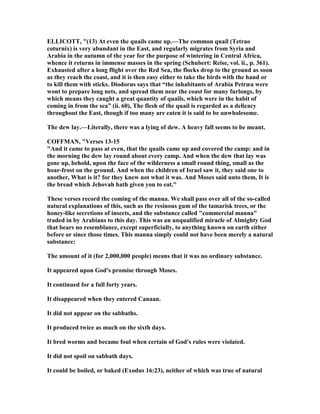
![manna.
The Jews (presumably Moses also) did not recognize it as anything natural.
"What is it ...?" It is generally accepted by most of the writers whom we have
consulted that here lies the source of the name "manna"; but Rawlinson translated
the Hebrew word here as meaning, "It is a gift."[14] Also, a Jewish writer has this
very interesting observation: "An alternative reading of this is, "Who is he?"[15] In
view of Jesus' identification of himself as the "Bread from Heaven," there must be
some validity in the alternative reading. evertheless, we shall use the word in its
ordinarily accepted sense. Fields pointed out that the usual Hebrew word for
"What" is [~mah], not [~man], as here, but that the form [~man] is found in the Tel
El-Amarna letters,[16] which are dated by the Encyclopedia Britannica as prior to
1375 B.C.[17] Thus, we have another proof that dates Exodus, not in the times of a
later priesthood who would not have known this word, but in the times of Moses.
Payne also noted that the word used here is "paralleled in Canaanite texts of the
second millennium B.C."[18]
CO STABLE, "Verses 13-21
"These [quail still] fly in such dense masses that the Arab boys often kill two or
three at a time, by merely striking at them with a stick as they fly.... But in spring
the quails also come northwards in immense masses from the interior of Africa, and
return in autumn, when they sometimes arrive so exhausted, that they can be caught
with the hand. ..." [ ote: Keil and Delitzsch, 2:66-67.]
Egyptian art pictures people catching the birds in hand nets. [ ote: Hannah, p134.]
The Hebrew word man, translated into Greek manna and transliterated from Greek
into the English word "manna," is an interrogative particle that means "What?"
The Greek word manna means "grain" or "bread." From this has come the idea
that the manna was similar to bread. An omer is about two quarts dry measure (
Exodus 16:16).
Jesus Christ compared Himself to the manna ( John 6:33; John 6:47-51; John 6:53-
58). It is a type (a divinely intended illustration) of Christ. Our Lord gave Himself
unreservedly, but each Christian has no more of Him experientially than we
appropriate by faith. Manna also represents Christ in His humiliation giving His
flesh so we might have life ( John 6:49-51). To meditate on Him is to feed on the true
manna ( John 6:38-40).
Students of Exodus have explained Exodus 16:18 in various ways. Some old Jewish
commentators said it describes what happened when each family had finished
collecting the manna and had gathered in their tent to pool their individual
amounts. Then they discovered that they had collected just the right quantity for
their needs. Some Christian commentators have suggested that the Israelites
gathered all the manna each day in one central place and from there each family
took as needed. There was always enough for everyone. The former explanation](https://image.slidesharecdn.com/exodus16commentary-160909165528/85/Exodus-16-commentary-69-320.jpg)
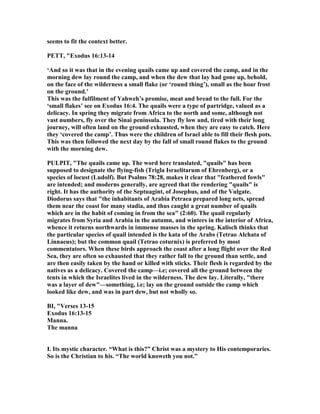










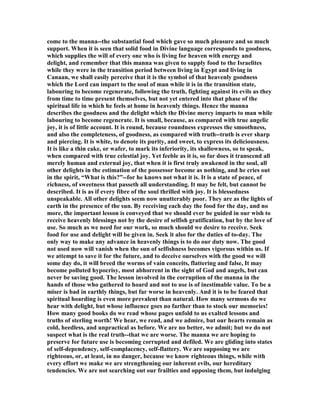






![thought themselves wiser and better managers than their neighbours, and who would
provide in case it should fail next day), putrefied, and bred worms, and became good for
nothing. Note, That proves to be most wasted which is covetously and distrustfully
spared. Those riches are corrupted, Jam_5:2, Jam_5:3. Let us set ourselves to think, [1.]
Of that great power of God which fed Israel in the wilderness, and made miracles their
daily bread. What cannot this God do, who prepared a table in the wilderness, and
furnished it richly even for those who questioned whether he could or no? Psa_78:19,
Psa_78:20. Never was there such a market of provisions as this, where so many hundred
thousand men were daily furnished, without money and without price. Never was there
such an open house kept as God kept in the wilderness for forty years together, nor such
free and plentiful entertainment given. The feast which Ahasuerus made, to show the
riches of his kingdom, and the honour of his majesty, was nothing to this, Est_1:4. It is
said (Exo_16:21), When the sun waxed hot, it melted; as if what was left were drawn up
by the heat of the sun into the air to be the seed of the next day's harvest, and so from
day to day. [2.] Of that constant providence of God which gives food to all flesh, for his
mercy endures for ever, Psa_136:25. He is a great house-keeper that provides for all the
creatures. The same wisdom, power, and goodness that now brought food daily out of
the clouds, are employed in the constant course of nature, bringing food yearly out of the
earth, and giving us all things richly to enjoy.
CALVI , "14.And when the dew that lay was gone up. The shape of the manna is
here briefly described, viz., that it was like the dew condensed into small round
grains. Its taste will be also mentioned elsewhere; but here it was sufficient to show,
that this fecundity was not natural, but miraculously given to the clouds, so that
they should daily rain manna. For as to the idle talk of certain profane persons,
(176) that the manna falls naturally in certain countries, who would thus display the
force of their genius, as if they convicted Moses of falsehood, because he mightily
extols a mere trifle, — it! is all an absurdity which may be easily refuted. It is indeed
true, that in certain parts of the world they collect white grains, to which the name
of manna has been vulgarly given, but (177) which one of the Rabbins will have to
be Arabic; but it is neither a food, nor does it drop daily from the clouds, nor has it
anything in common with this food, which the Prophet properly dignifies with the
title of “angels’ food,” because God, who opens the bowels of the earth for the
ordinary food of man, at that time made provision for the nourishment of His
people from heaven. And that it may appear beyond a doubt that this food was then
created miraculously, and contrary to the order of nature, these points are to be
taken into consideration. First, It did not appear in the wilderness before the hour
assigned by Moses in obedience to God’s command. Secondly, o change of weather
prevented the manna from dropping in a regular measure; neither frost, nor rain,
nor heat, nor winter, nor summer, interrupted the course of its distillation. Thirdly,
A quantity sufficient for the immense multitude was found every day, when they
took up an omer for every individual. Again, on the sixth day, the quantity was
doubled, that they might lay by a second omer for their Sabbath food. Fifthly, If
they preserved any beyond their due allowance, it was subject to putrefaction,
whereas, on the Sabbath day, the second portion remained good. Sixthly, Wherever
they were, this blessing of God always accompanied them, whilst the neighboring
nations lived on corn, and the manna was only known in their camp. Seventhly, As
soon as they entered a fruitful and corn-growing country, the manna ceased.](https://image.slidesharecdn.com/exodus16commentary-160909165528/85/Exodus-16-commentary-88-320.jpg)













![smote them. Is there no plague any longer for the perverse? What are the discords
that convulse families, the uncurbed passions to which nothing is sacred, the jaded
appetite and weary discontent which hates the world even as it hates itself? what but
the judgment of God upon those who despise His provision, and must needs gratify
themselves? Be it our happiness, as it is our duty, to trust Him to prepare our table
before us, while He leads us to His Holy Land.
The Lord of the Sabbath already taught His people to respect His day. Upon it no
manna fell; and we shall hereafter see the bearing of this incident upon the question
whether the Sabbath is only an ordinance of Judaism. Meanwhile they who went out
to gather had a sharp lesson in the difference between faith, which expects what
God has promised, and presumption, which hopes not to lose much by disobeying
Him.
Lastly, an omer of manna was to be kept throughout all generations, before the
Testimony. Grateful remembrance of past mercies, temporal as well as spiritual,
was to connect itself with the deepest and most awful mysteries of religion. So let it
be with us. The bitter proverb that eaten bread is soon forgotten must never be true
of the Christian. He is to remember all the way that the Lord his God hath led him.
He is bidden to "forget not all His benefits, Who forgiveth all thine iniquities, Who
healeth all thy diseases ... Who satisfieth thy mouth with good things." So foolish is
the slander that religion is too transcendental for the common life of man.
16 This is what the Lord has commanded:
‘Everyone is to gather as much as they need. Take
an omer[a] for each person you have in your
tent.’”
BAR ES,"An omer - i. e. the tenth part of an Ephah, see Exo_16:36. The exact
quantity cannot be determined, since the measures varied at different times. Josephus
makes the omer equal to six half-pints. The ephah was an Egyptian measure, supposed
to be about a bushel or one-third of a hin. The word omer, in this sense, occurs in no
other passage. It was probably not used at a later period, belonging, like many other
words, to the time of Moses. It is found in Old Egyptian. See Lev_19:36.](https://image.slidesharecdn.com/exodus16commentary-160909165528/85/Exodus-16-commentary-102-320.jpg)

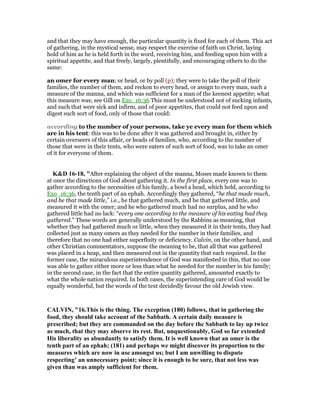
![COKE, "Exodus 16:16. An omer— In Exodus 16:36 an omer is said to be the tenth
part of an ephah. According to Bishop Cumberland, the ephah contains seven
gallons, two quarts, and about half a pint in wine measure; so that an omer was
about three quarts, or a little more probably than six pounds weight, Roman
measure. This was the smallest measure of things dry, known by the ancient
Hebrews. The homer, mentioned Leviticus 27:16 was a different measure from this.
BE SO , "Exodus 16:16. According to his eating — As much as is sufficient. An
omer is the tenth part of an ephah: about six pints, wine measure. This was certainly
a very liberal allowance, and such as might abundantly satisfy a man of the greatest
strength and appetite. Indeed, it would seem too much, were it not that it was very
light food, and easy of digestion.
ELLICOTT, "(16) Every man according to his eating.—Comp. Exodus 12:4. Each
man was to gather according to his immediate need and that of his family. o one
was to seek to accumulate a store.
An omer-About three pints English.
For every man.—Literally, for every head. As families would average four
members, each man would have to gather, on an average, six quarts. If even 500,000
men gathered this amount, the daily supply must have been 93,500 bushels.
His tents.—Heb., his tent.
COFFMA , "Verses 16-20
"This is the thing which Jehovah hath commanded. Gather ye of it every man
according to his eating; an omer a head, according to the number of your persons,
ye shall take it, every man for them that are in his tent. And the children of Israel
did so, and gathered some more, some less. And when they measured it with an
omer, he that gathered much had nothing over, and he that gathered little had no
lack; they gathered every man according to his eating. And Moses said unto them,
Let no man leave of it till the morning. otwithstanding they hearkened not unto
Moses; but some of them left of it till the morning, and it bred worms, and became
foul: and Moses was wroth with them."
The injunction here was addressed to the problem of greed and hoarding, and the
wonder that each had exactly enough whether he gathered much or little was used
by the apostle Paul as an incentive to Christian giving (See 2 Corinthians 8:14). He
also added that Christian liberality is commanded and that such is God's way of
"proving Christians" (2 Corinthians 9:13).
"An omer a head ..." Although not a matter of world-shaking importance, it is
amazing that scholars describe this measure variously as "seven pints,"[19] "just
over two liters,"[20] "approximately four pints"[21] "six and 1/2 pints,"[22] and](https://image.slidesharecdn.com/exodus16commentary-160909165528/85/Exodus-16-commentary-105-320.jpg)
!["six half-pints."[23]
"And Moses was wroth with them ..." It is amazing that the people had so little trust
in God that they violated His laws with impunity, and such an attitude on the part
of many in Israel was enough to have kindled the anger of any righteous man.
evertheless, Moses loved them, and later, he actually offered his life as a sacrifice
to save them, an offer which God declined to accept.
EXPOSITOR'S DICTIO ARY, "Exodus 16:16
The same hand that rained manna upon their tents could have rained it into their
mouths or laps. God loves we should take pains for our spiritual food. Little would
it have availed them, that the manna lay about their tents, if they had not gone forth
and gathered it, beaten it, baked it. Let salvation be never so plentiful, if we bring it
not home and make it ours by faith, we are no whit the better.
—Bishop Hall.
An Omer for Each Man
How great a virtue is temperance, how much of moment through the whole life of
man! Yet God commits the managing so great a trust, without particular law or
prescription, wholly to the demeanour of every grown Prayer of Manasseh , and
therefore when He Himself tabled the Jews from heaven, that omer, which was
every man"s daily portion of manna, is computed to have been more than might
have well sufficed the heartiest feeder thrice as many meals. For those actions which
enter not into a Prayer of Manasseh , rather than issue out of him, and therefore
defile not, God trusts him with the gift of reason to be his own chooser.
—Milton, Areopagitica.
PETT, "Verses 16-18
‘This is what Yahweh has commanded. You gather of it every man according to his
eating. An omer a head, according to the number of your persons you will take it,
every man for those who are in his tent. And the children of Israel did so, some
more, some less. And when they measured it out with an omer he who gathered
much had nothing over and he who gathered little had no lack. They gathered every
man according to his eating.’
The people are commanded by Yahweh to gather an omer of manna per head. But
the fact that they may take according to their eating may suggest not so much the
use of an exact measurement as an indication of the size of vessel to use per person.
But ‘according to their eating’ may simply mean according to how many there are
who will need to eat. For the overall impression is of an omer a head. And as it
turned out that provided sufficiency for all with nothing left over.
“An omer.” This is only found here. It was probably a small bowl which contained
the tenth part of an ephah (Exodus 16:36).](https://image.slidesharecdn.com/exodus16commentary-160909165528/85/Exodus-16-commentary-106-320.jpg)

![A more curious fact we can scarcely conceive: and it is the more curious, because it
occurred, not occasionally in a few instances, but continually, for forty years,
through the whole camp of Israel.
It arose, I apprehend,
1. From God’s merciful disposition towards them—
[A variety of circumstances might occur from time to time to prevent some heads of
families from making the necessary exertion before the sun should have dissolved
the manna, and have deprived them of the portion which they ought to have
gathered. Illness, in themselves or their families, might incapacitate them for the
discharge of their duty in this matter; or a pressure of urgent business cause them to
delay it till it was too late. In this case, what must be done? God, in his mercy, took
care that there should be in some a zeal beyond what their own necessities required,
and that their abundance should he sufficient to counterbalance and supply the
wants of others. In order to this, he needed only to leave men to the operation of
their own minds. They did not collect the food by measure, but measured it after
they had brought it home; that so they might apportion it to every member of their
family, according to the divine command. Hence it would often occur, that one who
was young, active, vigorous, and disengaged, would exceed his quota; whilst another
who was enfeebled by sickness, or depressed by sorrow, or occupied with some
urgent business, as that of attending on his sick wife and family, might collect but
little. either the one might think of administering relief, nor the other of receiving
it; but in all cases where there was excess or defect found in the exertions of one,
there was a corresponding want or superfluity in another; so that, on measuring the
whole, there was no superfluity or defect throughout the whole camp.
In fact, this, in some respect, obtains throughout the whole world: for though there
is doubtless a great disparity in men’s possessions, arising from different
circumstances, the rich unwittingly supply the necessities of the poor, by dispersing
their wealth in return for the comforts or elegancies of life: and thus, to a much
greater extent than men in general are aware, is equality produced among them; all
having food and raiment, and no one possessing more.]
2. From their bountiful disposition towards each other—
[In this view St. Paul quotes the very words of my text. He is exhorting the
Corinthians to liberality in supplying the wants of their poorer brethren: he tells
them, however, that he did not mean to burthen them for the purpose of easing
others; but only that, by an equality, their present abundance might be a supply for
the wants of others; who, in return, might supply their wants, in case circumstances
should arise to admit of it and require it; that so there might be, under all
circumstances, an equality: as it is written, “He that had gathered much had
nothing over; and he that had gathered little had no lack [ ote: 2 Corinthians 8:13-
15.].” This sense does not at all oppose that which I have before given: on the
contrary, it rather confirms the former sense; for it supposes that the overplus was](https://image.slidesharecdn.com/exodus16commentary-160909165528/85/Exodus-16-commentary-108-320.jpg)
![collected accidentally, as it were, in the first instance, and without any express
intention to dispose of it to others: but on its being found to exceed their own wants,
they liberally dispensed it to supply the wants of others; the donors at one time
being the recipients at another; and the obligations conferred being mutual, as
occasion required.
This, too, is still agreeable to the order of God’s providence in the world. o one can
tell what change of circumstances may arise, to elevate or depress any child of man:
but events continually occur to render a reciprocation of friendly offices both
practicable and necessary, and to call forth amongst ourselves the dispositions that
were exercised amongst the persons spoken of in our text.]
But, to enter more fully into the design of God in this fact, we must notice it,
II. As a mystical ordinance or appointment—
That the manna was a type of Christ, is beyond a doubt: our blessed Lord himself
drew the parallel, in the most minute particulars [ ote: John 6:31-58.] — — — On
this account the manna is called “spiritual meat [ ote: 1 Corinthians 10:3.]:” and
when, in the bestowment of it, there was so remarkable a circumstance perpetuated
throughout the whole camp for forty years, we cannot doubt but that it was
intended to convey some particular and very important instruction. or does the
construction put upon it by St. Paul in one point of view at all militate against a
different construction of it in another view. His interpretation refers to it only as a
temporal ordinance: but, as it was a spiritual ordinance also, we must endeavour to
derive from it the instruction which. in that view, it was intended to convey [ ote:
St. Matthew’s explanation of Isaiah 53:4-5. (See Matthew 8:16-17.) does not
invalidate the construction put upon it by St. Peter, 1 Peter 2:24. Both senses were
true: but the spiritual sense was the more important.] — — — I think, then, that we
may see in it,
1. Our privilege as Believers—
[Believers now feed on Christ, as the whole Jewish nation fed upon the manna: and
from day to day it is found, that “they who gather much have nothing over; and
they who gather little have no lack.” In the Church of God at this day persons are
very differently circumstanced; some having much leisure, and deep learning, and
many opportunities of attending ordinances in public, and of acquiring information
in private; whilst others are so entirely occupied with temporal concerns, or so
remote from opportunities of instruction, that they can gather but little
comparatively of the heavenly bread. But have the one therefore any superfluity, or
the other any want? o. We will ask of those who are most devoted to the word of
God and prayer, whether they find their attainments in knowledge and in grace so
abundant, that they have more than their necessities require? o. A blind Papist
may boast of his works of supererogation, and of having merits to sell for the benefit
of less-favoured people: but “ye, Beloved, have not so learned Christ:” ye know, that
if your attainments were an hundredfold more than they are, there were scope](https://image.slidesharecdn.com/exodus16commentary-160909165528/85/Exodus-16-commentary-109-320.jpg)
![enough for the employment of them, without overburthening your souls: you would
still “forget all that was behind, and be reaching forward for that which was before,
if by any means you might obtain the prize of your high calling in Christ Jesus
[ ote: Philippians 3:13-14.].” On the other hand, I will ask of those whose
attainments are more contracted; Do you not find that your more slender portion is
sufficient for you? You feed on the Lord Jesus Christ, as the bread of life: and do
you not find that he nourishes your souls; and that pardon, and peace, and holiness,
are the fruits of your communion with him? Yes: it is said, “He that believeth” (not
he that is very strong in faith) “shall be saved;” yea, and that “all who believe
(whatever be their stature or growth in grace) are justified from all things.” If you
be but a child, incapable of digesting strong meat, you find that “the sincere milk of
the word” is sufficient to nourish and support you; and that if you be but a lamb in
Christ’s flock, “he carries the lambs in his bosom,” because “it is not the will of your
Father that one of his little ones should perish.” This is no reason for your
neglecting to exert yourselves to the uttermost: but it is a comfort to you to know,
that, though from the peculiarity of your circumstances you have been able to
gather but little, you neither have, nor shall have, any occasion to complain that you
have “lacked” what was needful for you. If you have had no superabundance of
grace, “your strength has been according to your day.”]
2. Our duty, as Saints—
[All, whilst they judged their first offices due to those who were immediately
dependent on them, considered themselves as members of one great family, and
bound to administer help to all whose necessities should require it. Thus should the
whole collective mass of believers consider themselves bound to render every
possible assistance to every part of Christ’s mystical body. Every joint is to supply a
measure of nutriment according to its capacity, for the good of the whole body; that
so the whole may be strengthened, and edified in love [ ote: Ephesians 4:15-16.].
The command is plain, “Strengthen ye the weak hands, and confirm the feeble
knees: say unto them that are of a fearful heart, Be strong; fear not; your God will
come and save you [ ote: Isaiah 35:3-4 with Hebrews 12:12-13.].” With whatever
we be enriched, we should be ready to impart of our stores liberally and without
grudging; considering that we are but stewards of all that we possess, and that in
dispensing to others the benefits we have received, whether they be of a temporal or
spiritual nature, we most resemble our Heavenly Father, and best answer the ends
for which those blessings have been committed to us. True, indeed, we have not any
thing of our own, which we can impart to others; (we have no more oil in our lamps
than is wanted for ourselves [ ote: Matthew 25:8-9.] ;) nor can any diligence in the
head of a family supersede the necessity of every member gathering for himself; (for
“every man must bear his own burthen [ ote: Galatians 6:5.]:”) but still, as
instruments in God’s hands, we may be serviceable to many [ ote: James 5:19-20.],
and may, as golden pipes, convey the golden oil, for the enlightening and edifying of
the Church of God [ ote: Zechariah 4:12 with 1 Thessalonians 5:11; 1
Thessalonians 5:14.].]
Having thus marked the distinct views in which I conceive the fact before us ought](https://image.slidesharecdn.com/exodus16commentary-160909165528/85/Exodus-16-commentary-110-320.jpg)
![to be regarded, I will now, in conclusion, suggest the instruction to be derived from
it in a collective view. We may learn from it, I think,
1. Contentment—
[The whole people of Israel had but this food for forty years; nor, except for use on
the Sabbath-day, was any of it to be treasured up, even for a single day. The whole
people of Israel were to subsist on God’s providence, exactly as the birds of the air
and the beasts of the field. or was any thing more than food and raiment to be the
portion of so much as one amongst them: with this they were to be content; and with
a similar portion should we also be content [ ote: 1 Timothy 6:8.]. Hear St. Paul’s
experience on this subject: “I have learned in whatsoever state I am, therewith to be
content. I know both how to be abased; and I know how to abound: everywhere,
and in all things, I am instructed both to be full and to be hungry, both to abound
and to suffer need [ ote: Philippians 4:11-12.].” Precisely such should be the frame
of our minds also. We should offer continually, and from our inmost souls, that
prayer which our Lord has taught us, “Give us day by day our daily bread:” and we
should really be willing to live dependent on our God for every blessing, whether for
body or for soul, whether for time or for eternity.]
2. Confidence—
[In parting with any superfluity which they might have attained, the whole people of
Israel shewed that they looked to God alone for a supply of their necessities, and
that they had no doubt of his continued care even to the end. The same lesson should
we also learn. We should “take no thought for the morrow, but seek first the
kingdom of God and his righteousness, and rest assured that all needful blessings
shall be added unto us [ ote: Matthew 6:31-34.].” We should regard God as our
Parent; who, if he neglect not the birds of the air, or the meanest worm of the earth,
will surely not neglect his own children, but will rather feed them with bread from
heaven, and cause that bread to follow them in all their journeys, than leave them
one day without the supply that is needful for them.]
3. Liberality—
[Certainly, to give away the superabundance which they had gathered, when they
had not any thing in hand for their subsistence on the morrow, was a bright
example of generosity. I am far from saying that we, under our dispensation, should
carry our liberality to the same extent; but I have no doubt but that the spirit which
they manifested should be cultivated by us also, and that to a much greater extent
than is generally imagined. The instruction given by John the Baptist to the people
of his day was, “He that hath two coats, let him give to him that hath none; and he
that hath meat, let him do likewise [ ote: Luke 3:11.].” If it be thought that this was
nothing but an Eastern proverb, I answer, that St. Paul, in the very place where he
quotes the words of my text, proposes to our imitation the example of the
Macedonians, which scarcely fell short of the very letter of St John’s instructions:
“For at a time when they were in a trial of great affliction and in deep poverty](https://image.slidesharecdn.com/exodus16commentary-160909165528/85/Exodus-16-commentary-111-320.jpg)
![themselves, they yet abounded unto the riches of liberality; being willing to give not
only to their power, but beyond their power, and praying him with much entreaty to
take upon him the office of dispensing their alms to their afflicted brethren [ ote: 2
Corinthians 8:1-4.].” ay more, he proposes to us the example of our blessed Lord
himself, who “though he was rich. yet for our sakes he became poor, that we
through his poverty might be rich [ ote: 2 Corinthians 8:9.].” Let this mind then be
in you, my beloved brethren; and account yourselves rich. not in proportion to what
you can consume upon yourselves, but according to what you are able to administer
for the benefit of others. “In bearing one another’s burthens, ye shall best fulfil the
law of Christ [ ote: Galatians 6:2.].”]
BI, "Verses 16-18
Exodus 16:16-18
Gather of it every man according to his eating.
Spiritual assimilation
Why did each receive but three quarts a day? Might not a nutritious and delicious
food like this be stored, and become an article of merchandise and a source of
wealth? o, the Edenic law was not merely a penalty, but a method of mercy, of life,
and health. It required labour. But there is a profounder reason for the prayer,
“Give us this day our daily bread.” We are to get out of to-day all we can, and trust
God for to-morrow. We possess only what we can assimilate, so the miracle does no
more than provide for one day. You say that you possess property. o; another may
more truly possess it. I who tarry by your garden, or the beggar who feasts upon its
beauty with appreciating and admiring eyes, gets more out of it than you. You hurry
away to business early in the morning, and are gone till dark, too burdened, it may
be, to give it a glance. So with your library or pictures. He possesses who assimilates.
If your wealth makes you anxious, or leads you to dissipation, then you possess not
wealth, but anxiety and disease. You may give your child wealth, but it is better to
put moral wealth into mind and heart than to burden down with money, which may
sink his soul in ruin. So with books and associates. We grow by what we eat. What
does that child read? Who are his friends? We really eat both. Christ used this
figure, and said we were to eat His flesh and drink His blood. This means the
assimilation of spiritual forces, the incorporation of His life and character as we
grow to be like those we make our bosom friends. Our character is warped,
shrivelled, and weakened, or it is enriched and ennobled by those with whom we
habitually and intimately live, as they are mean and wicked, or pure and princely.
(E. Braislin, D. D.)
Lessons
We are hereby taught--
1. Prudence and diligence in providing food convenient for ourselves and our
households; what God graciously gives we must industriously gather, with quietness
working, and eating our own bread, not the bread either of idleness or deceit. God’s
bounty leaves room for man’s duty.
2. Contentment and satisfaction with a sufficiency; they must gather, “every man](https://image.slidesharecdn.com/exodus16commentary-160909165528/85/Exodus-16-commentary-112-320.jpg)
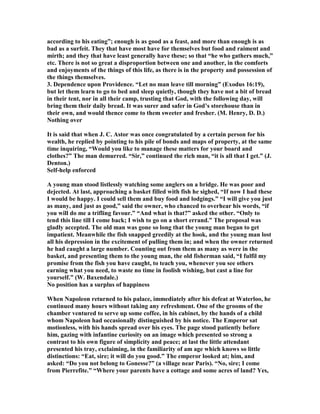






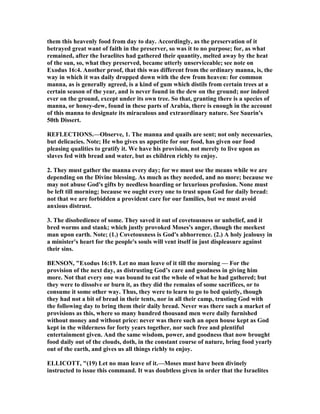



![two omers a head, exactly twice as much as on the previous six days. The Jews did
not know what to make of that. Even the rulers of the people went to Moses for an
explanation. As Keil noted:
"It is perfectly clear from this event, that the Israelites were not acquainted with
any sabbatical observances at that time, but that, while the way was practically
opened, it was through the Decalogue that it was raised into a legal institution."[24]
Therefore, we must finally reject the allegations that, "The sabbath was an ancient
institution observed by pre-Mosaic Hebrews." Such an allegation was made by
Rylaarsdam[25] and others, but the facts regarding the sabbath are as follows:
1. There is no sabbath commandment in Genesis. Some cite Genesis 29:7 as such,
but "sabbath" is not in the passage.
2. The very first occurrence of the word "sabbath" in the entire Bible is right here
in Exodus 16:23.[26]
3. Furthermore, in this passage, the sabbath is not introduced as The Sabbath, but
merely as a rest. Misunderstanding of this has come about because of an
unfortunate rendition in the King James Version, which has "The rest of thy Holy
Sabbath." Rawlinson cited the inaccuracy of this rendition, pointing out that, "the
absence of the article is a strong indication that the idea was new."[27]
4. God revealed his sabbath, not to Adam, nor to anyone on the other side of the
Flood, nor to anyone ever born upon earth before Moses, for the prophet of God
stated that "God revealed His holy sabbath through Moses ( ehemiah 9:13-14).
5. Furthermore, the very first revelation of it was "in the wilderness," as we have it
in this chapter. Ezekiel wrote: "I (God) brought them into the wilderness ... and
gave them my sabbaths to be a sign between me and them" (Exodus 20:10-12).
6. The sabbath was never a sign between God and all people, but a sign between
God and Israel (Exodus 31:17).
7. The reason assigned by God for keeping the sabbath was not the prior existence
of the institution, but the deliverance of Israel from Egyptian bondage
(Deuteronomy 5:15).
8. The prophet Amos foretold that the sabbath would be "gone" when God caused
the sun to go down at noon and the earth to be darkened on a clear day (Amos 8:9).
9. Paul categorically declared that the sabbath was "nailed" to the cross of Christ
(Colossians 2:14).
10. The very name "sabbath" is Jewish to the core, deriving from the Hebrew word
[~shabbath], meaning "rest."[28] This would never have been the case if the
sabbath had derived from some pre-Mosaic period.](https://image.slidesharecdn.com/exodus16commentary-160909165528/85/Exodus-16-commentary-124-320.jpg)
![Therefore, in the light of the Word of God, those who find a pre-Mosaic sabbath
institution in this chapter are finding something that definitely is OT in it. As
Ralph Langley put it, "The origin of the sabbath is datable to the wilderness period,
and in particular to the manna-miracle."[29]
PETT, "Verse 21
‘And they gathered it morning by morning, every man according to his eating, and
when the sun grew hot it melted.’
Each morning they gathered an omer per person according to the number in each
tent. And ‘when the sun grew hot it melted’. While this does not exclude ants as
partly consuming it, it demonstrates that it was not mainly ants which disposed of it.
22 On the sixth day, they gathered twice as
much—two omers[b] for each person—and the
leaders of the community came and reported this
to Moses.
BAR ES,"Twice as much bread - See Exo_16:5.
From this passage and from Exo_16:5 it is inferred that the seventh day was
previously known to the people as a day separate from all others, and if so, it must have
been observed as an ancient and primeval institution.
CLARKE, "On the sixth day they gathered twice as much - This they did that
they might have a provision for the Sabbath, for on that day no manna fell, Exo_16:26,
Exo_16:27. What a convincing miracle was this! No manna fell on the Sabbath! Had it
been a natural production it would have fallen on the Sabbath as at other times; and had
there not been a supernatural influence to keep it sweet and pure, it would have been
corrupted on the Sabbath as well as on other days. By this series of miracles God showed
his own power, presence, and goodness, 1. In sending the manna on each of the six days;
2. In sending none on the seventh, or Sabbath; 3. In preserving it from putrefaction
when laid up for the use of that day, though it infallibly corrupted if kept over night on
any other day.](https://image.slidesharecdn.com/exodus16commentary-160909165528/85/Exodus-16-commentary-125-320.jpg)

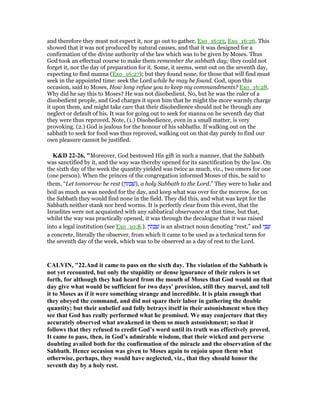




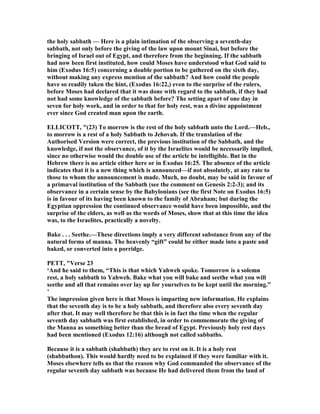



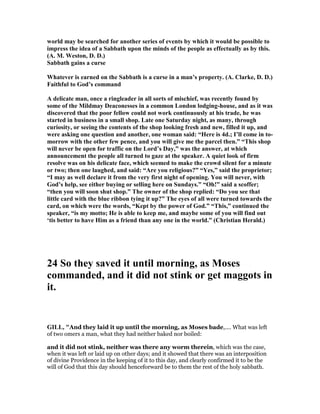



![the manna. They, therefore, accuse him of falsehood, refusing’ to believe anything
but their own eyes. Meanwhile the obligation of the Sabbath was set at naught by
them, nay, they sought to profane the day which God had hallowed, so that it should
in no wise differ from other days. Therefore does God justly inveigh against them
with much bitterness, for, addressing Moses, in his person He arraigns the obstinate
wickedness of the whole people. Assuredly Moses was not of the number of those
who had refused to obey God’s laws, but by this general charge, the multitude, who
had transgressed, were more severely rebuked, and a greater obligation is laid on
Moses to chastise the people, when a part of the blame is transferred to himself. By
the expression “How long?” God implies the intolerableness of their perversity,
because there is no end of their offenses, but, by thus provoking greater vengeance
by new crimes, they prove themselves to be incorrigible.
PULPIT, "There went out some of the people on the seventh day for to gather.
There will always be some persons in a nation, or in a Church, who will refuse to
believe God's ministers, and even God himself. They persuade themselves that they
"know better"—it will not be as announced—it will be as they wish it to be. More
especially is this so where the idea of continuance comes in—where some
interruption of the ordinary course of things is announced, which they deem
unlikely or impossible. Compare Genesis 19:14.
28 Then the Lord said to Moses, “How long will
you[c] refuse to keep my commands and my
instructions?
BAR ES,"How long - The reference to Exo_16:4 is obvious. The prohibition
involved a trial of faith, in which as usual the people were found wanting. Every miracle
formed some part, so to speak, of an educational process
GILL, "And the Lord said unto Moses,.... Who had seen and taken notice of what
those men had done, who went out into the field to seek for manna on the seventh day,
and was displeased with it, and therefore spoke to Moses out of the cloud:
how long refuse ye to keep my commandments and my laws? this is not said
merely with respect to their breach of the commandment of the sabbath, as if they had](https://image.slidesharecdn.com/exodus16commentary-160909165528/85/Exodus-16-commentary-140-320.jpg)
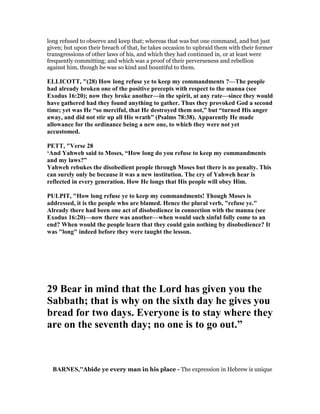



![GILL, "So the people rested on the seventh day. Did not attempt to go out of
their tents in quest of manna, as on other days, and observed it as a day of rest from
labour, and so they continued to do in successive generations.
PULPIT, "So the people rested. Having found by experience that nothing was to be
gained by seeking manna on the sabbath, and received the severe rebuke of Exodus
16:28, the people henceforth obeyed the new commandment, and "rested on the
sabbath day." Of the nature of the "rest" intended more will be said in the comment
on Exodus 20:8-11.
31 The people of Israel called the bread manna.[d]
It was white like coriander seed and tasted like
wafers made with honey.
BAR ES,"manna - It was not indeed the common manna, as they then seem to
have believed, but the properties which are noted in this passage are common to it and
the natural product: in size, form and color it resembled the seed of the white coriander,
a small round grain of a whitish or yellowish grey.
CLARKE, "Called the name thereof Manna - See Clarke’s note on Exo_16:15.
GILL, "And the house of Israel called the name thereof manna,.... For till now
they had given it no name; which shows that the words are not to be read as we render
them in Exo_16:15 it is manna, unless this is to be considered as a confirmation of that
name; but rather as an interrogation, "what is it?" though, from thence, "man" being the
first word they made use of on sight of it, might so call it; or as others, from its being
now an appointed, prepared, portion and gift, which they every day enjoyed; see Gill on
Exo_16:15,
and it was like coriander seed, white that the colour of the manna was white is not
only here asserted, but is plain from other passages, it being like the hoar frost, which is
white, Exo_16:14 and its colour is the colour of bdellium, Num_11:7 or pearl, which is of](https://image.slidesharecdn.com/exodus16commentary-160909165528/85/Exodus-16-commentary-145-320.jpg)
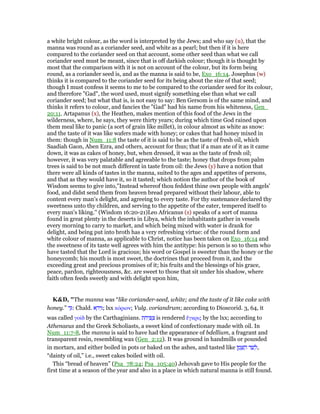
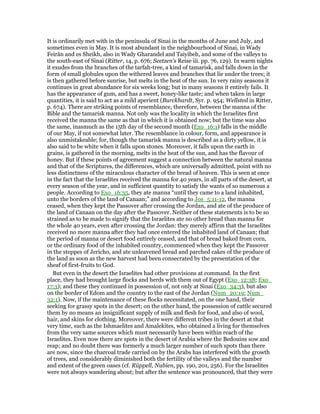



!["And the house of Israel called the name thereof Manna: and it was like coriander
seed, white; and the taste thereof was like wafers made with honey. And Moses said,
This is the thing which Jehovah hath commanded, Let an omer-ful of it be kept
throughout your generations, that they may see the bread wherewith I fed you in the
wilderness, when I brought you forth from the land of Egypt. And Moses said unto
Aaron, Take a pot, and put an omer-ful of manna therein, and lay it up before
Jehovah, to be kept throughout your generations. As Jehovah commanded Moses, so
Aaron laid it up before the Testimony, to be kept. And the children of Israel did eat
the manna forty years, until they came to a land inhabited; they did eat the manna,
until they came into the borders of the land of Canaan. ow an omer is the tenth
part of an ephah."
It is a gross error to date this paragraph late because it "implies the Ark and the
Tabernacle."[30] To be sure, these were not yet given to Israel, but Moses, writing
near the end of the forty-year wilderness experience, included right here in the
narrative where it belongs the things that God did later to memorialize the manna.
It is impossible to construe any sacred writing as a chronological account of
everything mentioned. Anyone familiar with the gospels is aware that many things
are recorded out of sequence chronologically. As Dobson explained it:
"The writer of Exodus is not saying that the manna was put in the Ark of the
Covenant in the wilderness of Sin. He is describing here something that was done
later on, because it has to do with the manna, which is the subject of the story.
Students of the Gospels will know that the Gospel writers also sometimes arranged
what they wanted to write according to subject, and not always according to the
time when it happened."[31]
Who can fail to be amused at Dummelow's "contradiction," based on the fact that,
"The pot of manna was said to be deposited before the Testimony (the tables of the
Decalogue), but in Hebrews 9:4 it is said to have been in the Ark."[32] For the
benefit of all such nit-pickers, both the tables of the Law and the pot of manna were
in the Ark!"
It is also a matter of great importance to some commentators that the mention of the
children of Israel and their coming into the borders of Canaan, and the continuation
of the manna until that time is boldly ascribed to some later writer. Such a
deduction of course is founded upon the rather naive conclusion that the Servant of
God who so magnificently prophesied the coming of the Lord Jesus Christ was
incapable of prophesying such a thing as the cessation of the manna when Israel
came into Canaan. We do not believe that a deduction of that kind is intelligent.
evertheless, if God needed another, and a later writer, to include these details in
the narrative, he might very well have used Joshua or Ezra, both of whom were
inspired and who could easily have done so. As Fields stated it:
Exodus 16:35 sounds as if it were written after the manna had ceased to be
provided. If so, this one verse was inserted by Joshua, or some other writer after
Moses' death. This probability no more casts doubt on the Mosaic authorship of
Exodus, than does the insertion of the facts about Moses' death casts doubt on the](https://image.slidesharecdn.com/exodus16commentary-160909165528/85/Exodus-16-commentary-151-320.jpg)
![Mosaic authorship of Deuteronomy.[33]
We should remember, as one of the wisest men of a whole millennium stated it, that,
"Joshua wrote some things in the Law of God (the Pentateuch) (Joshua 24:26) ...
these were public books and therefore not written without the authority of
Moses."[34]
CO STABLE, "Verses 31-36
Evangelical commentators generally have felt that the manna was a substance
unique from any other edible food ( Exodus 16:31). Some interpreters believe it was
the sap-like secretion of the tamarisk tree or the secretion of certain insects common
in the desert. [ ote: E.g, F. S. Bodenheimer, "The Manna of Sinai," Biblical
Archaeologist10:1 (February1947):2-6.] In the latter case the miracle would have
been the timing with which God provided it and the abundance of it. ormally this
sap only flows in the summer months. If this is the explanation, it was a miracle
similar to the plagues, not totally unknown phenomena but divinely scheduled and
reinforced. Even though there are similarities between these secretions and the
manna, the differences are more numerous and point to a unique provision. [ ote:
Cf. Ellison, pp89-90; and Davis, pp181-83.]
The "testimony" was the tables of the Mosaic Law that Aaron later kept in the ark
of the covenant (cf. Exodus 25:16). Moses told Aaron to preserve a pot of manna
before the Lord"s presence ( Exodus 16:33-34; cf. umbers 17:10-11). [ ote: See
Sailhamer, The Pentateuch . . ., pp274-75.] These physical objects memorialized
God"s faithful provision of both spiritual and physical foods (cf. Deuteronomy 8:3).
The Israelites were not completely separate from other people during their years in
the wilderness. As they traveled the caravan routes they would meet travelers and
settlements of tribes from time to time. They evidently traded with these people (cf.
Deuteronomy 2:6-7). Consequently their total diet was not just manna, milk, and a
little meat, though manna was one of their staple commodities. [ ote: See Itzhaq
Beit-Arieh, "Fifteen Years in Sinai," Biblical Archaeology Review10:4 (July-
August1984):28-54.]
God sought to impress major lessons on His people through the events recorded in
this chapter. These included His ability and willingness to provide regularly for
their daily needs and His desire that they experience His blessing. He gave them
Sabbath rest to refresh and strengthen their spirits as well as ample, palatable food
for their bodies: manna in the mornings and quail in the evenings.
PETT, "Verses 31-36
The Manna Preserved As a Memorial For the Future (Exodus 16:31-34).
Exodus 16:31
‘And the house of Israel called its name Manna (Hebrew ‘man’), and it was white
like coriander seed, and its taste was like wafers made with honey.’](https://image.slidesharecdn.com/exodus16commentary-160909165528/85/Exodus-16-commentary-152-320.jpg)


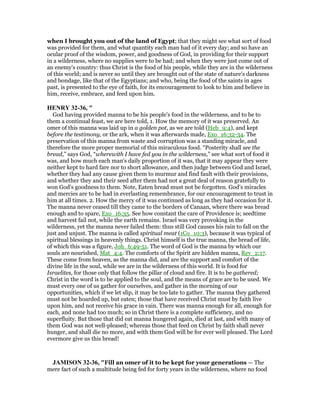
![of any kind is to be obtained, will show the utter impossibility of their subsisting on a
natural production of the kind and quantity as this tarfa-gum [see on Exo_16:13]; and,
as if for the purpose of removing all such groundless speculations, Aaron was
commanded to put a sample of it in a pot - a golden pot (Heb_9:4) - to be laid before the
Testimony, to be kept for future generations, that they might see the bread on which the
Lord fed their fathers in the wilderness. But we have the bread of which that was merely
typical (1Co_10:3; Joh_6:32).
K&D 32-35, "As a constant memorial of this bread of God for succeeding generations,
Jehovah commanded Moses to keep a bowl full (ר ֶּמע ָה ּאל ְ,מ the filling of a bowl) of the
manna. Accordingly Aaron placed a jar of manna (as it is stated in Exo_16:34, Exo_
16:35, by way of anticipation, for the purpose of summing up everything of importance
relating to the manna) “before Jehovah,” or speaking still more exactly, “before the
testimony,” i.e., the tables of the law (see Exo_25:16), or according to Jewish tradition,
in the ark of the covenant (Heb_9:4). תֶנ ֶצְנ ִ,צ from ןַנ ָצ to guard round, to preserve, signifies
a jar or bottle, not a basket. According to the Jerusalem Targum, it was an earthenware
jar; in the lxx it is called στάµνος χρυσοሞς, a golden jar, but there is nothing of this kind in
the original text.
CALVI , "32.And Moses said. Moses does not proceed with the history in order,
but by interposing these circumstances by anticipation, he the more confirms the
fact that this food was then created for the people by God’s special bounty, because
He desired an omer of it to be preserved as a memorial, which, undergoing no
putrefaction, handed down to posterity the gloriousness of the miracle. And first, he
propounds generally God’s command, and then, in the next verse, describes the
manner in which it was done, viz., that Aaron put it in a bottle or pot, and laid it up
by the Ark of the Covenant. Whence, too, it appears how high importance God
would have attached to this His bounty, since he wished its memorial to exist in the
sanctuary together with the tables of His covenant. The two expressions, conveying
the same meaning, “before the Lord,” and “before the Testimony,” are used in
commendation of the worship of the Law, that the people might know God’s power
to be near them in the sanctuary, not as if he were shut up in that place, or wished
their minds to be fixed upon the visible sign, but, desiring to provide against their
weakness, He in a manner descends to them, when he testified to the presence of His
power by external images. He descends to them, therefore, not (185) to occupy their
minds with a gross superstition, but to raise them up by degrees to spiritual
worship.
COKE, "Exodus 16:32. Fill an omer of it, &c.— We have here another peculiarity
of this manna, which sufficiently distinguishes it from the common sort, and
abundantly testifies its extraordinary nature; for though it stank when preserved to
the next morning, except on the sabbath-day, yet here, by the Divine Power, it was
preserved from putrefaction through successive generations. Had it been ordinary
manna, or that kind of liquid honey which is gathered in those deserts, why need an
omer of it have been laid up, that future generations might see the bread,](https://image.slidesharecdn.com/exodus16commentary-160909165528/85/Exodus-16-commentary-156-320.jpg)

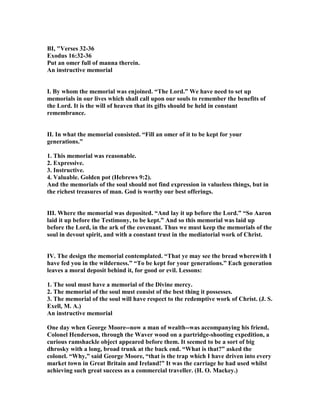


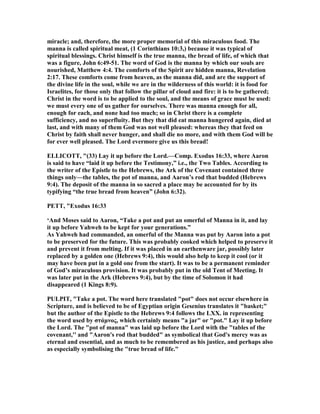



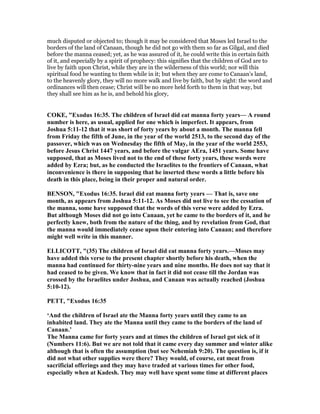

![in unnumbered instances, making our sins the occasion of deeper humiliation.] —
— —]
ext, let us notice the directions he gave respecting it—
[They ere to gather the manna from day to day, reserving none of it for the morrow
[ ote:, 19.]. This was to teach them their entire dependence upon God, and impress
them with a sense of God’s continued care of them. And though we are not
forbidden, yea rather are commanded, to make suitable provision for our families,
yet in the habit of our minds we are to be continually dependent on God, and free
from all anxious care or distrust — — —
They were not to gather any on the Sabbath, but to provide a double portion on the
day preceding it [ ote: 9.]. How early was the observance of the Sabbath inculcated!
The law was not yet given; therefore the observance of the Sabbath was not a mere
ceremonial commandment. or was the injunction relative to it either given by
Moses, or received by Israel, as a new thing: it doubtless had been enforced from the
beginning of the world: and consequently we, no less than the Jews, are bound to lay
aside all temporal concerns, as much as possible, on that day, and to consecrate it
wholly to the service of our God — — —
They were to preserve some of it in a pot, and lay it up before the Lord as a
memorial for future generations [ ote: 2, 33.]. They were not to forget the mercies
vouchsafed to them; but rather to transmit to their latest posterity the remembrance
of them; in order that they also might be led to serve and trust in the living God.
And have not we also memorials of the love of God to us? Search the records of our
national history, or let every one consult his own personal experience; and We shall
find abundant reason to adore that God, who has interposed for us in ten thousand
dangers, and supplied our continually returning wants — — —]
The peculiar interposition of God in relation to it deserves also particular notice—
[It was so ordered by his providence, that, when the members of the different
families had put together the portions which they had severally collected, and
measured it out again for the purpose of distributing to each his regular portion,
there never was found any redundancy, or any want [ ote: 6–18.]. What this was
designed to teach us, we are at no loss to determine; since God himself has suggested
the proper improvement of it. We all are members of one great family. Some, by
God’s blessing on their diligence, or by some other means, possess much; whilst
others, through a variety of circumstances, possess but little: we ought therefore
(not indeed to make one common stock, but) to “lay by us for the poor, according as
God has prospered us; “that, as far at least as the enjoyment of the necessaries of
life are concerned, there may be an equality; the abundance of the rich supplying
the necessities of their less-favoured brethren [ ote: 2 Corinthians 8:14-15.]. O that
there were in all of us such an heart, and that, instead of scraping together all that
we can save, for the purpose of enriching our families, we found our happiness in
doing good, being “glad to distribute, and willing to communicate!”— — —]](https://image.slidesharecdn.com/exodus16commentary-160909165528/85/Exodus-16-commentary-167-320.jpg)
![From viewing the mercies God vouchsafed to the Israelites, let us turn our attention
to,
II. The corresponding provision he has given us—
St. Paul tells us, that the manna of which we have been speaking, was “spiritual
meat [ ote: 1 Corinthians 10:3.].” It was carnal indeed in its immediate use; but it
typically shadowed forth the food on which our souls must live: and, to those who
partook of it in faith, it was a source of spiritual and eternal blessings. The Lord
Jesus Christ has fully explained the subject to us; and drawn a parallel between the
manna on which the Israelites subsisted, and himself as the life of our souls [ ote:
John 6:32-58.]. We shall not trace that parallel here [ ote: The parallel is drawn in
Dis. on John 6:34 and 1 Corinthians 10:3-4.], but consider the subject in a more
appropriate view.
Three things then we wish you to remark;
1. The freeness of this provision—
[What have we done to merit the gift of God’s dear Son? We were rebels against the
Majesty of heaven, and deserved nothing but “wrath and fiery indignation to
consume us”— — —The manna rained round the tents of the murmuring Israelites
was not more freely given, than Christ is sent to us, and salvation by him is offered
us in the Gospel [ ote: Isaiah 55:1.] — — —]
2. The suitableness—
[The manna was adapted to nourish equally the infant and adult. And to whom is
not Christ suited? The great sinner will find in him precisely such a Saviour as his
necessities require — — —The weak, the timid, the disconsolate, yea, all persons in
all possible circumstances, shall find, that he is as much suited to their individual
cases, as if God had sent him for them alone; and to their palate, as though they
themselves had chosen what kind of a Saviour they would have — — —]
3. The sufficiency—
[The vigour of all was renewed from day to day by means of the food provided for
them; and they were enabled to march or fight, as occasion required. And what
cannot he do who feeds upon the Lord Jesus Christ? What conflicts shall not he
support; what victories shall not he gain? “The grace of Christ will be sufficient for
him;” and he will be “able to do all things through Christ who strengtheneth
him”— — —“He that gathers most of this heavenly manna, will indeed have
nothing over; but he who gathers ever so little, shall have no lack” — — — Twice is
it repeated in our text, that they ate of the manna till they arrived at the promised
land: never did it fail them; nor did they ever need any other food. And thus
assuredly shall Christ continue to the end the support of all who feed upon him;](https://image.slidesharecdn.com/exodus16commentary-160909165528/85/Exodus-16-commentary-168-320.jpg)
![and, in possessing “that hidden manna,” they shall have all that they can want in
this dreary wilderness; they shall have an earnest and antepast of heaven itself
[ ote: Revelation 2:17.].]
PULPIT, "The children of Israel did eat manna forty years. Kalisch observes that
the actual time was not forty full years, but about one month short of that period,
since the manna began after the fifteenth day of the second month of the first year
(Exodus 16:1) and terminated just after Passover of the forty-first year (Joshua
5:10-12). It may be added that Mesas cannot have written the present passage later
than about the eleventh month of the fortieth year (Deuteronomy 1:3; Deuteronomy
34:10; Joshua 4:19); when the manna had continued thirty-nine years and nine
months. Until they came to a land inhabited. Kalisch translates "the land of their
habitation," or "which they were to inhabit," remarking that they had reached
inhabited countries, e.g; those of Sihon and Og, much earlier. But the words will not
bear this rendering. What the writer intends to note is, that the manna continued all
the time they were in the wilderness, until they reached inhabited territory, and
then further (in the next clause), that it lasted after that, until they came to the
borders of Canaan. He does not say that it even then left off. He writes exactly as
Moses might be expected to have written towards the close of his life. A later writer
would, as Canon Cook observes, have been more specific.
36 (An omer is one-tenth of an ephah.)
CLARKE, "Now an omer is the tenth part of an ephah - About six pints,
English. See Clarke’s note on Exo_16:16. The true place of this verse seems to be
immediately after Exo_16:18, for here it has no connection.
1. On the miracle of the manna, which is the chief subject in this chapter, a good deal
has already been said in the preceding notes. The sacred historian has given us the
most circumstantial proofs that it was a supernatural and miraculous supply; that
nothing of the kind had ever been seen before, and probably nothing like it had
ever afterwards appeared. That it was a type of our blessed Redeemer, and of the
salvation which he has provided for man, there can be no doubt, for in this way it
is applied by Christ himself; and from it we may gather this general conclusion,
that salvation is of the Lord. The Israelites must have perished in the wilderness,
had not God fed them with bread from heaven; and every human soul must have
perished, had not Jesus Christ come down from heaven, and given himself for the
life of the world.
2. God would have the Israelites continually dependent on himself for all their
supplies; but he would make them, in a certain way, workers with him. He](https://image.slidesharecdn.com/exodus16commentary-160909165528/85/Exodus-16-commentary-169-320.jpg)
